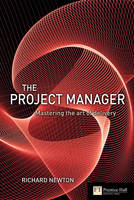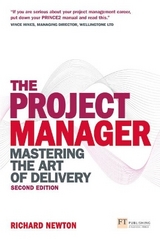
The Project Manager
FT Press (Verlag)
978-0-273-70173-6 (ISBN)
- Titel erscheint in neuer Auflage
- Artikel merken
- Communications -- learning to understand who the customers are, what they want, and how best to communicate with them - What actually is your project? Understanding the importance of scope and how best to define it - How to get your project started - Optimal personal styles for project managers - Managing your project - Getting the best out of your project team - A quick survey of the most important tools and techniques - When to constructively kill a project Whether you are just starting out in project management, or have a few years under your belt and want to achieve real mastery, The Project Manager will help you deliver more.
Richard Newton is a senior manager with twenty years experience in the field of projects. He has been responsible for IT and software development work, business change programmes, telecommunications projects, and launching new products. Additionally he has worked extensively as a management consultant. He has seen project management from all perspectives -- as a team member, as a project and a programme manager, as a supplier, and as a project sponsor and customer. He has been employed by a variety of major companies including Kodak, Coopers & Lybrand, Telewest Broadband, Ernst & Young, Energis and A.T. Kearney. He has worked in the UK, Europe, Australia and the US.
Preface Introduction The secret art Why read this book? A brief word on job titles Work-streams, projects, programmes, and portfolios A short overview of the contents One - Some basics What is a project? What is project management? What is a project manager? Who are projects for? What is success? Two - Listening and Talking The most important chapter in the book Your audience - who you must listen and talk to Listening - learning to understand what the customer wants Communicating with your audience Three - What actually is your project? The importance of understanding scope The key scoping questions Four - Some Key Traits The sense of ownership and involvement Good judgement - project management style Project management judgements - summary A touch of creativity Five - Getting your project started Planning Resourcing Budgeting Thinking about contingency and risk Mobilising Projects in the real world - common practical issues to overcome Six - Personal Styles Styles to avoid Styles to encourage Seven - Managing your project What should you manage? How do you know to take management action? How should you manage? Change control and management Decision making Eight - The team Getting the best from the project team Nine - The limits of knowledge The generalist vs. the specialist What should project managers not do? Specialist skills that should be recognised as not being the project manager's job Ten - The mechanics of project management The project manager's toolkit What more can you learn? Eleven - Knowing when to say no When do you actually need a project manager? Knowing the danger signals Constructively killing projects off Just say no Twelve - Closing Thoughts Quick reference guide - summary contents Index
| Erscheint lt. Verlag | 7.4.2005 |
|---|---|
| Sprache | englisch |
| Maße | 157 x 234 mm |
| Gewicht | 540 g |
| Themenwelt | Wirtschaft ► Betriebswirtschaft / Management ► Projektmanagement |
| ISBN-10 | 0-273-70173-8 / 0273701738 |
| ISBN-13 | 978-0-273-70173-6 / 9780273701736 |
| Zustand | Neuware |
| Haben Sie eine Frage zum Produkt? |
aus dem Bereich



